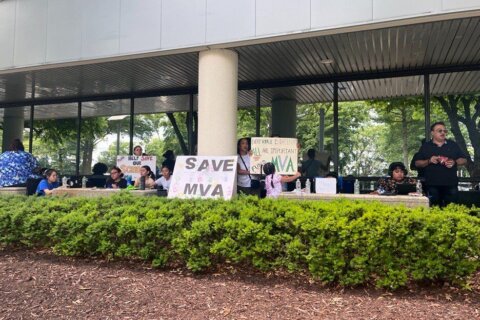This video is no longer available.
When this school year started, Amanda Villapando’s 4-year-old son, Leo, didn’t want to express himself.
In the mornings, he hid under his bed and said he didn’t want to go to his Arlington, Virginia, school. He shut down emotionally, and she had to comfort him before he got on the bus.
He slipped through the cracks and regressed, she said, because the classroom was overcrowded. There were more students with Individualized Education Plans, or IEPs, who needed support, and there weren’t enough teachers to offer it, she said.
So Leo transferred into the Integration Station program, which helps 2-5-year-old students with disabilities. Villapando says the program also allows 1-year-old children to attend as well. It offers early intervention and special needs services for Arlington students. It’s run through a partnership with The Children’s School, with the goal of helping those students get comfortable and integrated in a general education environment.
After the switch, the difference was significant, Villapando said. Leo wakes up excitedly on Saturdays and Sundays, asking whether it’s a school day. His child psychologist said he could reach the general education level by kindergarten if he continues to get the proper support in preschool.
But that progress may be in jeopardy, she said.
In an email to Integration Station families, Chief Academic Officer Gerald Mann said the program won’t be funded as part of the school division’s proposed budget for fiscal 2026.
The proposed budget is expected to be presented at a meeting next month.
Instead, Mann wrote, the plan “would further our shared goal of providing our students with an inclusive PreK experience through our Community Peer Program and would take effect in the 2025-2026 school year.” Students would attend class closer to their home schools as a part of that change.
For Leo and the other over 50 students involved in the program, however, Villapando said the consequences would be dire.
“This is going to be devastating for my son,” Villapando said. “It takes away my son’s hope for his future because they would put him back in the environment he was in at the beginning of the school year, and the regression would happen again.”
Villapando said she was a globally delayed toddler, and with help from her family and county, she was able to thrive, attending college and having a successful professional career.
Closing the Integration Station program, she said, would result in special needs students getting “lost in the shuffle.”
An outside consulting firm found that “exploring how services of the Integration Station are currently delivered and implementing a new model” could save $1 million.
“The added value of Integration Station existing substantially outweighs the minuscule amount of monetary restrictions and reductions that it would save you,” Mark Villapando, Amanda’s husband, said.
The cut isn’t final, though. Once the school system unveils its budget proposal, the school board can make changes before it’s ultimately approved.
If the change is passed, Mark Villapando said, “the system is going to be overrun, and they’re not going to have the expertise or the bandwidth to really help and develop these kids.”
Families who have a child that’s attended Integration Station, Amanda Villapando said, have described “how much this has bettered the lives of their children, whether their children were special ed or whether their children were Gen Ed peers, because their children have gone on to go into APS with a level of empathy and kindness that is deeper than a lot of the other peers.”
Get breaking news and daily headlines delivered to your email inbox by signing up here.
© 2025 WTOP. All Rights Reserved. This website is not intended for users located within the European Economic Area.








